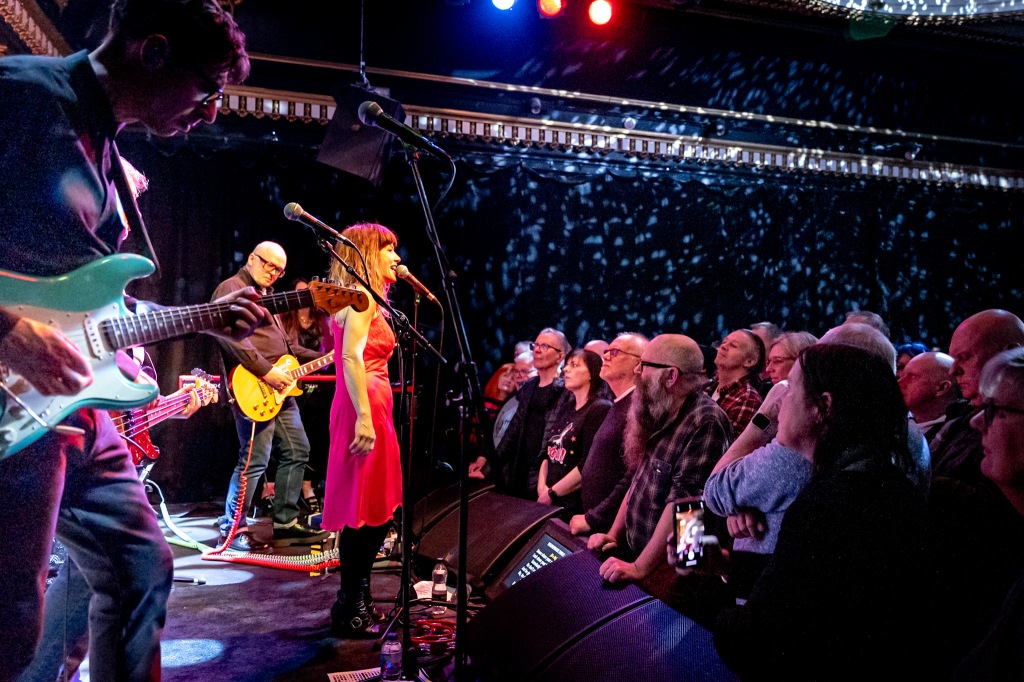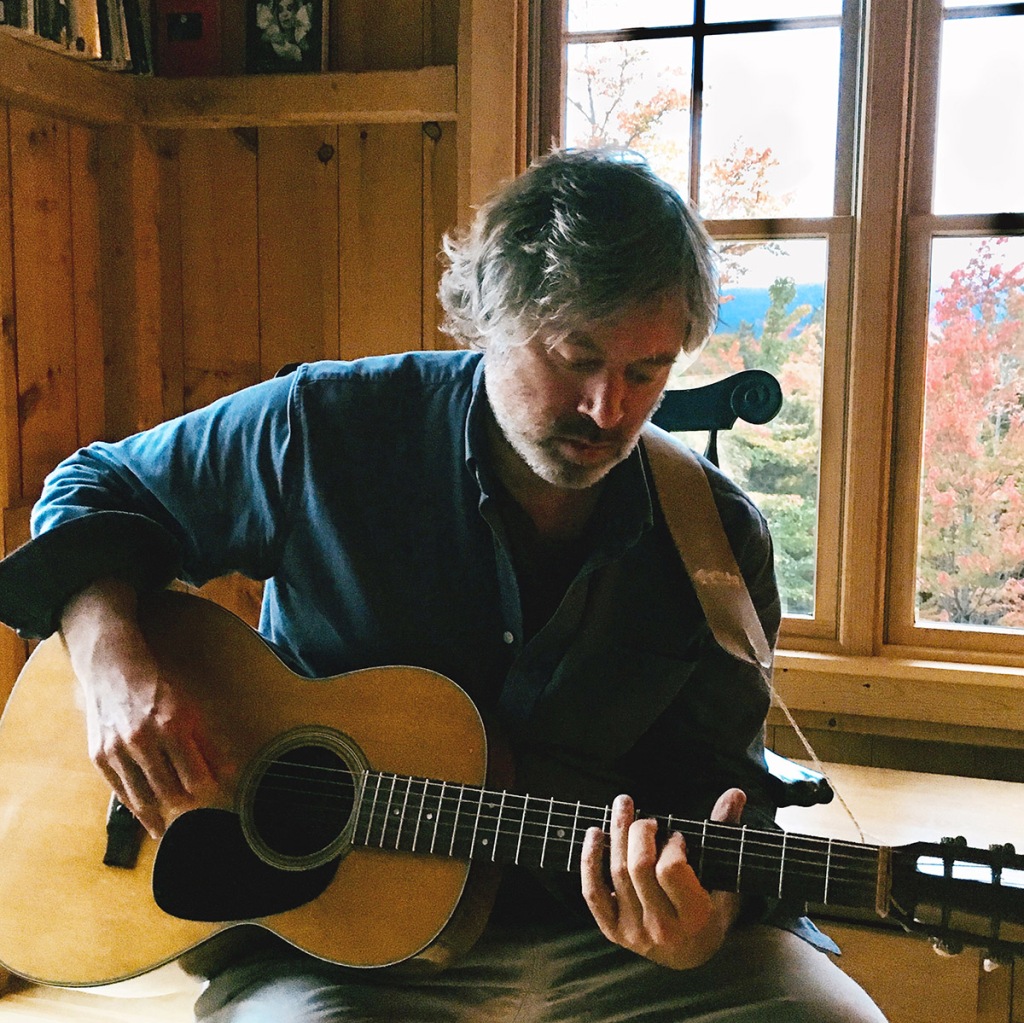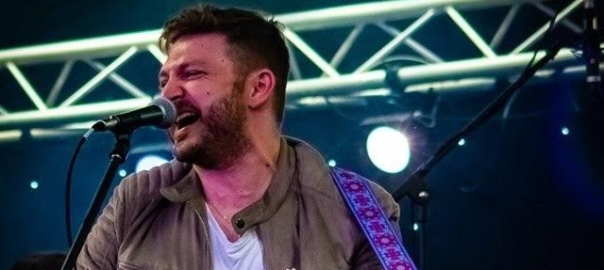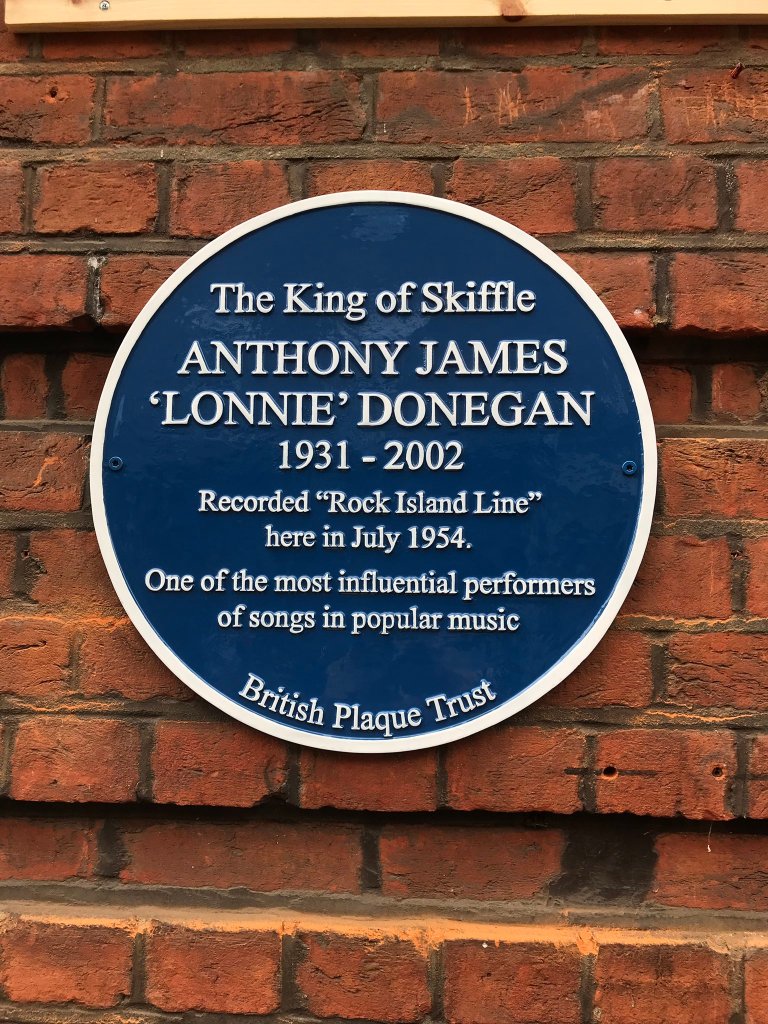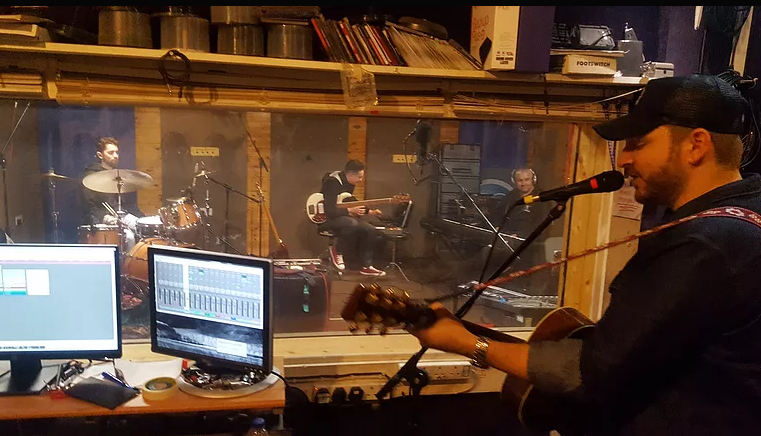Ahead of Fairport Convention’s 2024 Winter Tour, starting in February, I catch up with Simon Nicol. We discuss Dave Mattacks’ return to the Fairport fold, the forthcoming tour, this Summer’s Cropredy and why he won’t be retiring any time soon.
So you’re obviously looking forward to the Winter Tour then which starts early next month. What can fans expect this time?
Well, for those who didn’t catch DM (Dave Mattacks) with us last year, you’re in for a different kind of musical experience than the last twenty-five years with Gerry. That’s one thing. But the other thing that’s happened with DM, it’s not just the style of playing, it’s the way it’s easily opened up a lot of the repertoire that Peggy and I, and Ric, and DM kind of all know. Because that line-up from ‘85 to ’98, when DM moved over to America, created a lot of its own material. But, of course, Ric was easily able to adapt to much earlier material so it’s really only a case of Ric and Chris now having to learn old stuff if we want to go back to the early days of when Peggy joined. It’s suddenly opened up a huge tranche of the back catalogue which, I’m happy to say, we’re having a look at this year. We’ve been dusting off the old LPs and we’ve found some things that have never really been in the repertoire at all. So it’s going to be an adventure for us and a real voyage of discovery for some of the older – well the more mature members of our audience who perhaps remember us from college days and are now in retirement. They’ll be hearing some stuff that they haven’t heard for decades. And a lot of that will be brand-spanking-new for newbies.
Excellent. So there’s going to be quite a few surprises, then?
Yeah! I hope so! All good ones. You say it’s quite soon but I’ve got a daunting number of things to do before we all actually get together and start practicing under the one roof. Because we all live miles apart. Peggy’s in France when he’s not in this country, he’s over there. DM, obviously, he only comes over a few days before from Boston. I live down in East Kent. So we don’t actually see each other very much considering we’re kind of based in north Oxfordshire.

Has it all slotted in place, in terms of working together. Does it feel very comfortable having Dave Mattacks back?
Yes. We’re used to planning a repertoire in this way. There’s a lot of to-ing and fro-ing and discussions on the phone and WhatsApp groups, where we chew the fat. And then people go off and listen to the songs in question and we end up with a big rag-bag, a bucket of songs if you will. And Chris is the clever one. He sits down and tries to work it out – “Let’s put this one here. Let’s put that one there.” And then there aren’t too many instrument changes and not too many things in the same key and a bit of a rise and fall to the shape of the two sets.
Yeah, we’re very much looking forward to it and we’re used to working that way so when the time comes and we get together in the studio for the rehearsals – two days of that – everybody’s on the same page and there’s not much to be worked out. Just – “Does this still work in this key?” That’s one of the big questions (laughs) because obviously voices and so forth change.
Voices change over the decades! And talking of Dave Mattacks coming back, you never seem to have suffered the sort of rancour with former members that have often bedevilled other bands. That seems to suggest that Fairport Convention has always been a relatively happy working environment. Is that true?
Well, it’s many things. It’s a band. It’s an environment. It’s a family in many ways. I’m closer to the guys I’ve been working with for fifty years than I am to my own immediate family really – I spend more time with them! Been through more adventures! It’s been said before but no-one gets out of Fairport alive. You may stop coming to the gigs but, you know, underneath it all, if you scratch deeply enough do they not bleed Fairport?
So you’ve never really had any of those Noel and Liam Gallagher moments?
Oh.. well. Obviously there are hearty and firm disagreements occasionally and there have been moments when you haven’t spoken to people but there’s a parallel there going back to the family thing or in any small office. Occasionally there’ll be frictions but basically, if you’re a band and a band-member kind of person, I don’t get it. If you’re at daggers drawn and you don’t cut each other slack all the time then you’re probably in the wrong band. You’re probably working with the wrong collection of people because you’re just making life unpleasant for yourself.
Yes, it seems an incredibly sensible philosophy but it seems to evade quite a few bands.
Well I think there’s the famous difficulties which brothers always have when they form groups. There never seems to be a seamless happy bunch of brothers. I mean the Finn Brothers seem to do ok but what do we know about their.. they just make wonderful records. But the Kinks were at it when they were kids. And the Gallaghers dear oh dear. And even the Everlys used to travel to gigs separately and have their own managers and their own lawyers. They would talk to each other through their lawyers and they’d come on to the stage. One time I saw them they came on from different sides and when they went off they didn’t look at each other and they walked off separately…
So Fairport’s a largely happy family rather than a dysfunctional one then..
I don’t want to be all Pollyanna-ish about it but, you know, I think we’re all cutting each other slack all the time and happy to do so.
And moving on, from Fairport Convention’s vast back-catalogue, what album are you most proud of?
Oh God, I don’t know. It’s that favourite child question again isn’t it? I think it’s more of a repertoire to me. A performance on one album enshrines a particular place and a time and a collection of people at that point in their lives. But, you know, we’ve had ‘Crazy Man Michael’ in the repertoire, along with ‘Matty Groves’, since they first surfaced on Liege & Lief in 1969 and I don’t think there’s a definitive version of either of those songs. Certainly, there isn’t in my head when I go to sing that song. If I see it on the list and it’s coming up, I’m not thinking, “Oh, the definitive version of this was recorded on this particular album. This is what I’m going to try and emulate now and try and make it as close to that as possible.” You now, I’m not a human juke-box and the band doesn’t feel like that. We’ve got this song. We all know where it starts and finishes, what key it’s in, what tempo it is. And on the count of four, we’ll start playing it and what comes out that night will be tonight’s performance. It’ll have the same structure as last night’s performance but it’s not the same song. Because my mind will be somewhere else in this song. The person standing next to me playing will be on their own little passage from note one ‘til the end. And I’m sure it’s the same with actors. They perform the same play every night but every night is a first night for that play and that song because it’s a performance.

Even ‘Meet On The Ledge’ – probably your most well-known song from the live repertoire – that’s evolved massively over the years from the quite gentle and understated song when it first appeared to the rousing anthem for live performance now.
That’s right. It was just a ‘no-big-deal’ song on the second album. It was tucked away on Side Two, Track 4 which is a bit of a graveyard slot for most songs. It wasn’t what you heard when you dropped the needle but it has grown in the telling. It’s a song that’s grown in the telling and it’s acquired more reasons to perform it every year. And I know it means the world to people at Cropredy when we come to it – and not just because we can all go home soon! But because of what it’s come to mean to all the people who are there.
Yeah, it’s gathered extra meaning along the way for the audience and gathered more and more meaning over the years.
You also recently announced the final line-up for Cropredy this year. What are you most looking forward to? (apart from your own set of course!)
That’s another bit of a favourite child isn’t it! I’m looking forward to seeing the reactions of the audience who, implicitly, trust our judgement in selecting the bill and you always get the positive feedback and you always get… it’s a bit like TripAdvisor. You hear the best reviews and you hear the worst ones, you know? And you have to disregard the complete outliers because those aren’t a good ship to follow. And some acts you just know are nailed-on. They’re going to be an absolute banker in terms of the reaction. People’s response to them is just.. that’s why you book them. They’re a certainty. But the funnest acts or the ones that create the most warm feelings at my time of life are the ones that are largely unknown or perhaps under-exposed to the audience. And they go on and they’ve got this huge stage, this wonderful setting to perform to and an audience which is trusting and agog and waiting to be entertained. And you put somebody that’s not had a go before or maybe only has a hundred-and-fifty friends in the audience and then ten minutes later they’ve got the whole audience. Ten thousand new best friends! And that’s a wonderful feeling. And I can think of the Travelling Band having that experience happening to them and, of course, the Pierce Brothers
The Pierce Brothers, they were incredible.
If you weren’t there, I feel sorry for you!
I’d actually seen them, I think a week or so before at Womad and they were just on a small stage with maybe a hundred or so people and I thought, “There are going to go down pretty well at Cropredy.” But yeah it was just incredible.
They went down so well we booked them the next year which is, you know, an absolutely unique experience. Buy yeah, that’s like if you go back to last year for instance, we knew that Chic would be an absolutely 24-carrat performance. But what surprised me was the act before them. Because Toyah and Robert (Fripp) were a little bit of an unknown quantity. You had no idea what their repertoire would be derived from and then they came on and they just tore the place up. It started with ‘Paranoid’ I think, just the set-list from heaven and the performance was just… everything was turned up to the right level and it just absolutely cooked. So I had that same experience. I knew it was going to be ok. It might be great but it was better than both.
This year though, we’ve got some unexpected people, unknowns. And I can tell that you know the Spooky Men’s Chorale. I think that they are going to surprise a lot of people who wouldn’t have come upon them. And they’re so different. What they do is just absolutely heart-stoppingly beautiful and so funny and so moving and you can get all of that in the space of about ten seconds. He’s a brilliant showman, Steve, and I’m really pleased we managed to get them.

Other bands have run their own festivals over the years. The Levellers have been doing Beautiful Days for about 20 years I think, but I can’t think of a single one that’s lasted anywhere near as long as Cropredy. What do you think the secret is?
I don’t know but if I could put it in a bottle I could sell it. No, it’s great and all festivals have to confront the same logistical situations. The same questions have to be answered in many different ways. But there are more questions that set Cropredy apart really than make easy parallels with other festivals. It’s just the way it’s grown out of something that was in the village. It wasn’t started as a commercial thing. It literally was the village hall committee asking us if we’d perform for them after the village fete. So it got it’s roots down deep into the heart of the village at the very beginning rather than being something that was imposed on the village. So it’s always been welcomed and enabled by everybody in that postcode. And the fact it’s just grown little by little, almost just incrementally.

A big change was going from the one day, the Saturday thing, to incorporate the Friday. And that happened after quite a while and it was just such an obvious thing to do. It didn’t feel that weird because people were camping anyway in advance of it. Similarly, we moved again, changed it into a three-day festival but instead of incorporating a Sunday, we thought we’d go back again and bring people to the village a little early and everyone gets a relaxing free day to go home on the Sunday. Most festivals end on the Sunday night and there’s definitely a different feeling from ending a festival on a Sunday morning. That’s one thing that makes it stand out. And the fact that we’ve always tried to look at it as a punter would. You know, your experience from arriving. You see some festivals where people have to go and park half a mile west from the village and then they have to carry everything to a campsite a mile-and-a-half the other side of the village. Whereas at Cropredy we’ve got enough land to play with and the right size, with the smaller number of people attending. It means people can actually camp next to their car. But it’s just a practical thing like that. And because we wouldn’t want to stumble around on an unlit road, we light the village. We put our own lighting in because it’s safer and it’s practical. And road closures and things like that, we try to make it as good an all-round experience as we can.
Indeed, I’ve been going for years but I went with a friend who had not only never been to Cropredy but had never been to a festival before. I think this was two years ago, the first one after Covid. And he’d done loads and loads of camping so he knew campsites inside out and the drill with that but he’d never been to a festival before and he was like, “Oh, it’s really well-organised. It’s not what I was expecting at all. It’s like proper camping!”
Well, you can always improve things so every time you try and tweak things. The glamping has really taken off. So every year we expand that and it still sells out immediately, however many tents we put up. Because I suppose the demographic is not getting any younger, same as the band. So yeah, we try and make things comfortable but, you know, if you change anything in a way that’s noticeable there’ll be uproar! It’s like tinkering with the broadcast time of The Archers. You can’t do it quietly!

Wonderful. Is there anything else you want to tell us, ahead of the tour and ahead of Cropredy?
You can just take it from me that I appreciate every tour more as I get older. And I look forward to every Cropredy more and more. But after the two lockdown years, the two missed Cropredies, that period of enforced retirement made me value all the more what this band and this lifestyle and this business, this fellowship of people, has given me. And if I was ever thinking of retiring, making a choice to step away, that thought was sent to the bottom of Davey Jones’ locker big time. Because I would just miss it so much. And I love what I do and I love the people I work with and I’m so grateful for the opportunity when I wake up every morning and I can wriggle my toes and fingers and look forward to the van pulling up then it’s alright with me.
Fairport Convention’s Winter Tour begins on 6th February 2024
Tickets: https://www.fairportconvention.com/
Related posts:
Live review: Fairport’s Cropredy Convention August 2023
Live review: Fairport’s Cropredy Convention August 2022
Book review: ‘On Track: Fairport Convention – every album, every song’ by Kevan Furbank
Fairport Convention at Bexhill 2020
Live review: Fairport’s Cropredy Convention August 2018
Fairport Convention at Cropredy 2017
Album review – Fairport Convention ‘Come All Ye: The First Ten Years’
Fairport Convention – 50th anniversary gig at Union Chapel 2017
Fairport Convention at Cropredy 2014
Fairport Convention at Union Chapel 2014
Album review – Fairport Convention ‘What We Did On Our Saturday’














